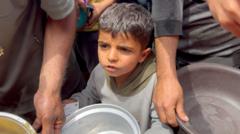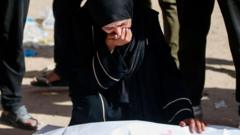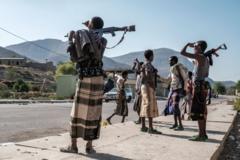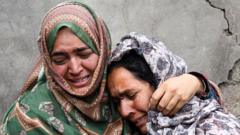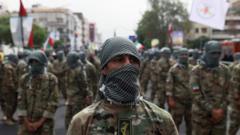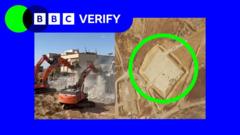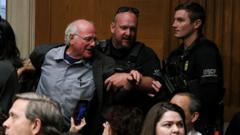The ongoing violence in Gaza has caught the attention of high-ranking US officials, emphasizing the urgent need for humanitarian assistance amid intense air strikes that have left many Palestinians dead. Recent remarks by Marco Rubio, a senior US diplomat, highlight the gravity of the situation as fatalities continue to mount.
US Expresses Concern Over Humanitarian Crisis in Gaza Amid Ongoing Violence
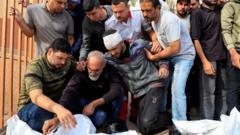
US Expresses Concern Over Humanitarian Crisis in Gaza Amid Ongoing Violence
US official Marco Rubio voices deep concern regarding the escalating humanitarian crisis in Gaza as Israeli air strikes continue, causing significant civilian casualties.
Rubio's statements came after a meeting of NATO foreign ministers in Turkey, where he described the dire humanitarian conditions in Gaza as troubling. He referenced the alarming reports of civilian casualties resulting from Israeli air strikes, which claimed at least 114 Palestinian lives over a recent 24-hour period. Despite affirming US support for Israel and its military operations against Hamas, he acknowledged the suffering of Gaza's civilian population and reiterated the need for aid delivery.
Gaza has been under a complete blockade by Israel for 10 weeks, severely limiting access to essential humanitarian supplies. The air strikes have intensified as Israel targets what it claims are Hamas fighters and infrastructure, following a cross-border attack on October 7 that killed approximately 1,200 people in Israel. In this context, Rubio emphasized the importance of Hamas’s surrender, arguing that any peace negotiations must occur under such conditions.
In southern Gaza, the aftermath of the bombardments has appeared particularly devastating, with large funeral processions marking the loss of life in Khan Younis. Residents recount harrowing experiences, relaying accounts of entire families being decimated in the violence. Amidst the chaos, health facilities find themselves overwhelmed, struggling to treat the influx of wounded civilians amid significant shortages of resources and capacity.
Furthermore, tensions regarding proposed aid distribution strategies have emerged, with a controversial US-Israeli plan facing rejection from the United Nations over ethical concerns. Humanitarian organizations are pressing for the immediate resumption of aid deliveries, arguing that international law mandates protections for civilians and access to medical and food supplies.
As the violence continues, residents of Gaza endure extreme conditions, and international leaders are faced with mounting pressure to address the humanitarian crisis. The call for immediate aid assistance stands in stark contrast to the ongoing military operations, creating a complex landscape of conflict, suffering, and urgent humanitarian needs.
Gaza has been under a complete blockade by Israel for 10 weeks, severely limiting access to essential humanitarian supplies. The air strikes have intensified as Israel targets what it claims are Hamas fighters and infrastructure, following a cross-border attack on October 7 that killed approximately 1,200 people in Israel. In this context, Rubio emphasized the importance of Hamas’s surrender, arguing that any peace negotiations must occur under such conditions.
In southern Gaza, the aftermath of the bombardments has appeared particularly devastating, with large funeral processions marking the loss of life in Khan Younis. Residents recount harrowing experiences, relaying accounts of entire families being decimated in the violence. Amidst the chaos, health facilities find themselves overwhelmed, struggling to treat the influx of wounded civilians amid significant shortages of resources and capacity.
Furthermore, tensions regarding proposed aid distribution strategies have emerged, with a controversial US-Israeli plan facing rejection from the United Nations over ethical concerns. Humanitarian organizations are pressing for the immediate resumption of aid deliveries, arguing that international law mandates protections for civilians and access to medical and food supplies.
As the violence continues, residents of Gaza endure extreme conditions, and international leaders are faced with mounting pressure to address the humanitarian crisis. The call for immediate aid assistance stands in stark contrast to the ongoing military operations, creating a complex landscape of conflict, suffering, and urgent humanitarian needs.



